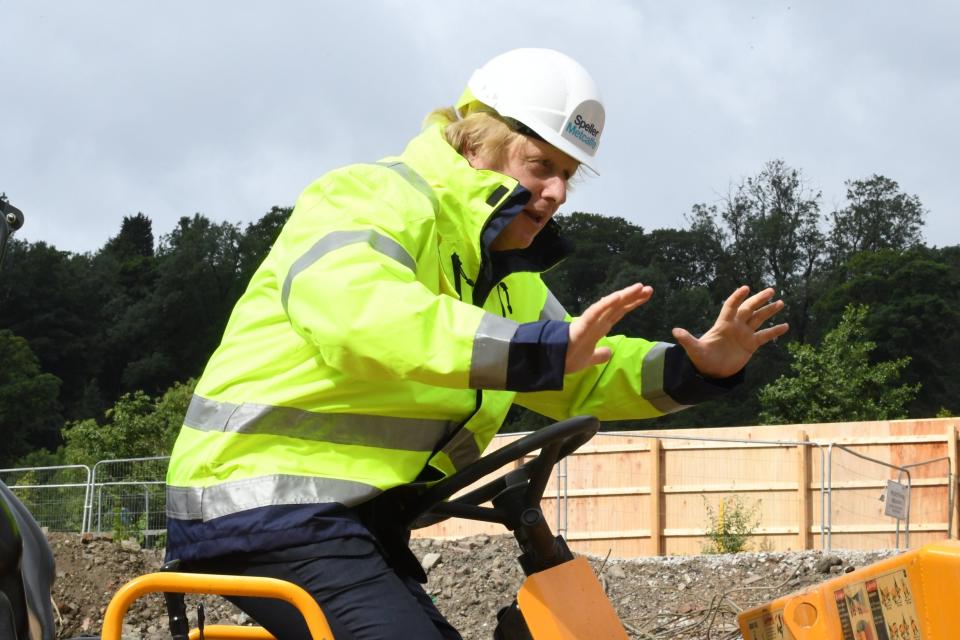Boris Johnson's plans to boost economy post-lockdown take GDP hit

Hopes of a v-shaped economic recovery were dealt a major blow today as revised figures showed the hit to GDP from Covid-19 was far worse than previously thought.
They came as Boris Johnson talked up plans to “build back better” and chuck large sounding sums of money at projects to get the economy moving.
Business has largely been supportive of the PM’s ideas, but some in the City are worry that he simply isn’t spending enough, noting the largest plunge in activity since 1979.
GDP fell by 2.2% between January and March, worse than the 2% fall reported previously as all sectors of the economy suffered – health and education in particular.
That’s a worrying taste of what is to come since the UK only went into lockdown at the end of the period measured.
Samuel Tombs, chief UK economist at Pantheon Macroeconomics, said the latest figures could be summed up simply: "The biggest contraction for 40 years, even though Q1 contained just nine lockdown days." The data "was just the prelude" to far worse figures, he added.
City economists expect a second quarter fall in GDP of between 15% and 20%.
Recent figures suggest the economy sank by 20% in April, the largest monthly drop since records began.
Thomas Pugh at Capital Economics said: “The 2.2% drop in GDP in Q1 2020 was the joint largest fall since 1979 and sets the stage for an unprecedented fall in Q2, despite evidence that the economy partially rebounded in May and June. But it will still take the economy until 2022 before it regains its pre-crisis level.”
Other economists note that the Prime Minister’s “levelling up” agenda looks tougher than ever, with the well to do managing to save while poorer people find debts hard to manage.
Howard Archer at the EY Item Club said: “Analysis indicates that it is the least well-off that have tended to find their finances increasingly squeezed during the second quarter.”
Johnson praised the speed of recent Covid schemes including building the Nightingale hospitals and companies collaborating to supply ventilators.
He said: “We know people are worried now for their jobs and businesses and we’re waiting as if between the flash of lightning and the thunderclap.”
Procurement contracts are likely to be a key talking point as Johnson firms up the spending plan, with the 2018 collapse of contractor Carillion still looming large.
Federation of Small Businesses national chairman Mike Cherry said: “It’s encouraging to see the Government returning to its levelling-up agenda, an agenda made all the more important as we emerge from a recession. For too long the small business community has been blighted by regional disparities and creaking infrastructure. It’s good to see the first steps towards addressing these shortcomings – the focus on local roads and towns is welcome…
“Those lucky enough to make successful procurement bids need to pay, pay, pay those further down supply chains on time, otherwise these new initiatives will be beset by delays and hardship for small business owners at an already challenging time. This New Deal should contain a fair deal for small firms.”
Leo Quinn, chief executive of construction outsourcer Balfour Beatty, said: “The Prime Minister’s commitment to accelerate the UK’s long-term infrastructure pipeline is a critical factor for the country’s recovery. As well as stimulating regional and national economies, it will generate vast employment opportunities across the country and help provide our younger generations with employable skills. Without this, following the fall-out from COVID-19, we could see widespread structural unemployment issues.
“It is a commitment I welcome warmly, but our industry must prioritise sustainable, digital and innovative solutions in our delivery. In doing so, we will safeguard our future capabilities and provide certainty for the workforce of tomorrow.”
Edwin Morgan, director of policy at the Institute of Directors, said: “Good infrastructure is an essential foundation for the economy, so a commitment to moving quickly is vital. The government is correct to point to essential upgrades, but while it’s right to look ahead, we are still in the midst of this crisis.
“Many directors have been left without financial support, and we may well not yet have seen the worst in terms of insolvencies and unemployment. Targeted support for those who have been left behind is needed now in order to make sure recovery plans can have their full benefit”.

 Yahoo Finance
Yahoo Finance 